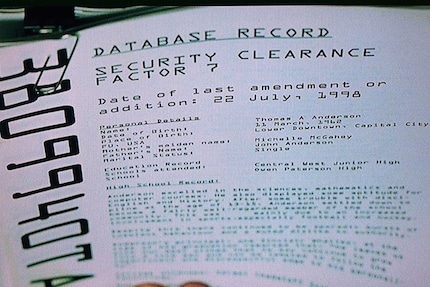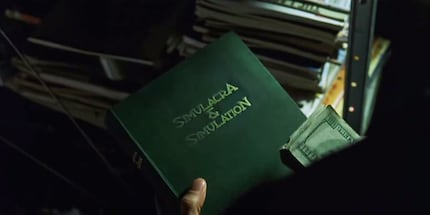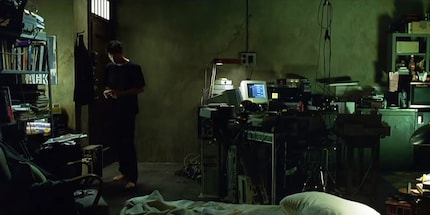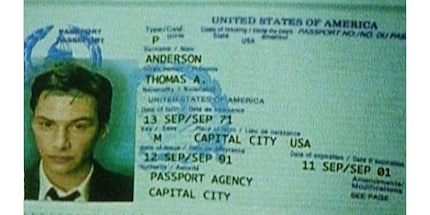
Background information
The best remakes of all time
by Luca Fontana

In the sci-fi thriller «The Matrix», Neo is nothing but an empty shell, a superhero template without a personality. Having said that, there is one scene that gives us a brief glimpse into his past. A glimpse that explains a lot.
The movie is philosophical, dystopian and socio-critical. Released in 1999 and disguised as an action movie, «The Matrix» raises fundamental questions regarding human and technological advancements. This earned the film its status as the best science fiction movie of all times.
But the main character Neo (played by Keanu Reeves) has no fears, dreams or hopes. He generally acts as the storyline demands. The only time his character marginally comes through is while he’s being driven past a restaurant and he utters the sentence: «I used to eat there. Really good noodles.»
In the film, Neo is portrayed as a generic template. He’s everybody and nobody at the same time. Or is he? Before Neo is even aware of his existence in the Matrix, he is interrogated by agents. In the subsequent four minutes, viewers learn more about the character Neo than they do throughout the rest of the film.
Let’s explore that.
The scene starts with an interrogation carried out by the ringleader of the agents: Agent Smith (Hugo Weaving). Agents are humanlike programmes in the Matrix whose primary function is to eliminate anyone who might reveal the truth about the Matrix or harm its system. Smith slams a file on the table. It contains Neo’s entire life. And his criminal record at the very front.
Viewers only get a split second to catch a glimpse of the record. This is at around 13 seconds in the video above. Press pause at the right moment and rotate the image 180 degrees and you see this:

According to his criminal record, Neo was born under the name Thomas A. Anderson on March 11, 1962 in Lower Downtown, Capital City. At least in the Matrix. Later on, Neo will learn that the real world is roughly in the year 2199. A post-apocalyptic world in which time can only be estimated. The simulation in the Matrix is set to 1999. So about 200 years in the past. Accordingly, Neo’s true year of birth in the real world isn’t 1962 but more like 2162.
Neo’s parents are Michelle McGahey, named after the movie’s art director, and John Anderson. Neo attended Central West Junior High and Owen Paterson High; the latter named after the set designer. At the age of 13 to 14, so during his time at Central West Junior High, Neo had repeated trouble with discipline. However, thanks to his increased involvement in football and hockey, he became a well-regarded member of the school community.
See how ultra-generic all these names are?
At Owen Paterson High, Neo made a name for himself in natural sciences, mathematics and computers. He also showed great interest in history and literature. This is reflected in the first minutes of the movie. You see Neo hiding floppy disks containing illegal malware in the book «Simulacra and Simulation». Allow me to explain: it’s arguably one of the whackiest collection of essays ever.

The book was written by the Frenchman Jean Baudrillard in 1981. According to IMDb trivia, the actors and actresses of the film were required to read Baudrillard’s philosophical piece before even receiving the movie script and being allowed to be in the film. The makers of the movie considered the book fundamental in understanding the concept of the Matrix. But I’ll get back to that later.
Now back to Neo. In his legitimate job, he’s an introvert programmer for the respectable software company MetaCortex. «Meta» derives from Greek and stands for «between, above, beyond or transcend». «Cortex» is the outer layer of the brain. So one could say that MetaCortex means transcending the limits of the brain. A foretaste of what Neo will do later in the movie.
Neo has stood up against authorities since his teenage years. Or rather, rebelled against the system. So it’s hardly surprising that he later joins the rebellion against the world of machines.
But before that happens, Neo indulged his passion for breaking rules in his «second life», as Agent Smith calls it in the interrogation scene. In that life, Neo is a computer hacker who penetrates computer systems, steals information and sells it under his hacker alias «Neo». By the way, Neo is an anagram of One. So «the one» or «the chosen one».
In the film, Neo says that all his life he had had the feeling that something was wrong with the world. A sense of not knowing whether he was still dreaming or already awake. So during his time as a hacker, Neo tried to find the man who could tell him what was wrong with the world: Morpheus (Laurence Fishburne). Where do Neo’s doubts about reality stem from?

His interest in literature could provide an answer to this question. His apartment is filled with books. One of them is Jean Baudrillard’s «Simulacra and Simulation» – the book the cast of the movie had to read before shooting began. In essence, the Frenchman claims that we live in a simulation constructed to cover up the fact that reality has long disappeared and crossed over to hyperreality. He defines hyperreality as something like the copy of the copy of the copy (and so on) of the former reality.
Let me give you an example: Disneyland is not a real place. The castle, the setting, the people dressed up as Mickey, Donald and Co. – we all know they’re fake. The blatantly artificial park suggests that the world outside is a real one. But Baudrillard suggests that this real world no longer exists, because it has been replaced by countless copies. And that’s precisely what excessively artificial Disneyland is trying to hide from its visitors.
To make Baudrillard’s ideas more accessible, his work is often compared to the Matrix. But that only works to a certain extent. After all, in the movie, reality still exists outside the Matrix. Albeit a reality that is not pretty. Anyone who swallows a red capsule will recognise this. So the people in the movie have a choice. In Baudrillard’s world, they do not.
The simulacrum is never that which conceals the truth – it is the truth which conceals that there is none. The simulacrum is true.
Critics have repeatedly described Baudrillard’s brain training as intellectual masturbation. Nonetheless, Neo seems to have intensely reflected on Baudrillard’s ideas. Maybe that’s where he got his notion that something’s completely wrong with the world? It would explain why he’s looking for answers to a question he shouldn’t know about in the first place. It would also explain his paranoid move of stating a fake date of birth in his passport.

You can take a look at the passport during the interrogation scene if you pause the image after about 57 seconds and flip the picture 180 degrees.
But the question remains why a reserved programmer would turn into a leader. Morpheus is captured because he believes in Neo and wants to save him. Neo, who doesn’t believe in himself, does not want Morpheus to make this sacrifice. So Neo sets off and tries to free Morpheus, even though everybody tells him it’s a suicide mission. But our hero Neo ignores them. The hacker who doesn’t believe in himself is suddenly leading the resistance.
Tank: «So what do you need? Besides a miracle.» Neo: «Guns. Lots of guns.»
His change of character doesn't really make much sense. Except for that the storyline demands it. Plus, it represents the archetypical generic hero who goes through a transformation and surpasses himself. But Neo’s involvement in the football and hockey team proves that he learned early on how to gain respect and how to lead. Not only is he a recognised team member but also a respected one. Sure, football and hockey aren’t exactly the same thing as a revolution against machines. But Neo’s change of mind does seem a little less absurd with this in mind.
Neo doesn’t have many traits. But they're definitely there. He’s defiant and stands up to authority. Not always openly but definitely secretly. He’s a smart guy and excelled in subjects that require logical thinking. Mathematics. Computer science. Plus he’s well-read. This makes him open to new things but sceptical. Apart from that, Neo is capable of taking responsibility for himself and others.
So why did the makers of «The Matrix» put so much effort into hiding all these traits by cramming them into a few split seconds and making them practically invisible to the viewer?
What looks like lazy scriptwriting was totally intentional. And this despite the fact that the main focus in «The Matrix» is on Neo. The real story begins centuries previous to this. When humans and machines fought wars against each other and the sky darkened.
«Animatrix – The second Renaissance, Part 1». Part 2 is also on YouTube.
Movies with exposition often start somewhere exhaustingly far back in time. Not so in «The Matrix». The Wachowski siblings, writers and directors of the movie, throw viewers right into the action.
Agents attacking Trinity (Carrie-Anne Moss) for observing somebody. She disappears through a phone box. No time for explanations.
Who are the agents? Why can Trinity stopin mid-air ? And what is the Matrix anyway? Not important. Not for the moment at least. Like Neo, the viewer only finds out much later. Whenever something’s explained to him, it’s explained to us viewers. Whenever he’s astonished, so are we. And when Neo breathes «Whoa!», we do to.
This is most apparent in the first 45 minutes of the movie. According to IMDb trivia, Neo utters 80 sentences. 44 of which – so more than half – are questions. That's about a question a minute. And totally intentional. Us viewers are supposed to project ourselves onto him as if he were a blank canvas. We're supposed to feel as if we’d taken that red pill ourselves. But this only works if the character «Neo» has as few traits as possible and just as many as necessary. That’s why he’s so incredibly generic. And it’s genius!
Just think about it. His name at birth? Anderson. Only Smith would be more generic but that’s the name of the agent. As the name suggests, Central West Junior High, the school he went to, is located in the central west – wherever that may be. His place of birth? Lower Downtown, Capital City. In Swiss terms, this would roughly correspond to something like «the Zurich community of Generikon», which most closely resembles New York, even though the filming took place in Sydney, Australia.
There’s just one more thing: Neo likes noodles. Don’t we all?
I write about technology as if it were cinema, and about films as if they were real life. Between bits and blockbusters, I’m after stories that move people, not just generate clicks. And yes – sometimes I listen to film scores louder than I probably should.
Interesting facts about products, behind-the-scenes looks at manufacturers and deep-dives on interesting people.
Show all